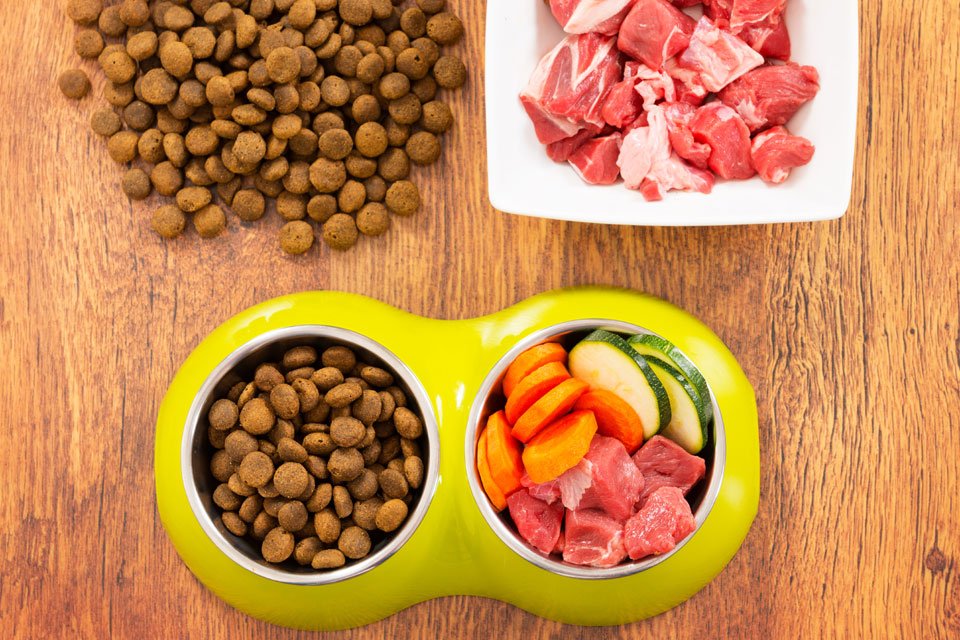Healthy Additions to Improve Your Dog’s Diet

Ensuring a well-balanced and nutritious diet is crucial for the overall health and well-being of your canine companion. While commercial dog food provides essential nutrients, incorporating healthy additions can elevate your dog’s diet, promoting vitality and longevity.
Just as in human nutrition, diversity in food choices can contribute to a spectrum of health benefits for our furry friends. From nutrient-rich fruits and vegetables to protein-packed lean meats, there are various options to enhance your dog’s meals and support their optimal health. In this article, we will explore some of the nutritious additions that can be included in your dog’s diet to enhance their overall health.
1. Fruits and Vegetables:
Fruits and vegetables are not only delicious but also crucial for your dog’s overall health. Incorporating a variety of colorful options like carrots, rich in beta-carotene for eye health, blueberries packed with antioxidants to boost their immune system, apples for added crunch and fiber, and green beans for a low-calorie treat, can provide a range of essential vitamins and minerals. However, it’s imperative to ensure that these offerings are safe for dogs and are served in appropriate portions. Always remove seeds, pits, and cores, as these can pose a choking hazard, and be aware of fruits that may be toxic to your pet.
2. Omega-3 Fatty Acids:
Omega-3 fatty acids, commonly found in fish oil, play a pivotal role in supporting your dog’s coat, skin, and joint health. Adding a small amount of fish oil to your dog’s regular meals not only contributes to a shiny coat and alleviates skin issues but also provides essential nutrients for their overall well-being. Consult with your veterinarian to determine the appropriate dosage for your dog’s size and breed. Monitoring your dog’s response is crucial, and any signs of adverse effects should be promptly addressed.
3. Lean Protein Sources:
Just like humans, dogs require protein for muscle development and overall health. Lean protein sources such as cooked chicken, turkey, lean beef, and even shrimp can be added to their diet. These proteins are not only delicious for your pet but also provide essential amino acids. It’s important to note that while lean meats like chicken and turkey are generally safe for dogs, when it comes to shrimp, you might wonder, can dogs eat shrimp?
Shrimp can be a healthy addition in moderation, but it’s crucial to serve them cooked, plain, and without any seasoning or sauce. Always remove the shells and ensure they are thoroughly cleaned to avoid potential hazards. Consult with your veterinarian to determine the appropriate amount of shrimp for your dog’s size and breed.
4. Probiotics:
Probiotics are beneficial microorganisms that aid in maintaining a healthy gut flora, supporting optimal digestion, and bolstering the immune system in dogs. Incorporating canine-specific probiotic supplements or natural sources like yogurt with live cultures into your dog’s diet can promote digestive health. However, it’s essential to introduce probiotics gradually to prevent potential digestive upset. Regular monitoring and consultation with your veterinarian can help tailor the probiotic regimen to your dog’s specific needs.
5. Eggs:
Eggs are a versatile and nutritious addition to your dog’s diet, providing an excellent source of high-quality protein and essential amino acids. Whether served cooked or raw (with guidance from your vet for raw eggs), eggs offer essential nutrients, including vitamin D and various B vitamins. It’s crucial to cook eggs thoroughly to eliminate any risk of bacterial contamination. Introduce eggs into your dog’s diet in moderation and monitor for any signs of allergies or sensitivities.
6. Sweet Potatoes:
Sweet potatoes are not only a tasty treat but also a nutritional powerhouse for dogs. Rich in fiber, vitamins (particularly A and C), and minerals, sweet potatoes contribute to digestive health and overall well-being. These tubers offer a healthy alternative to traditional treats and can be baked or steamed for a nutritious snack. The fiber content in sweet potatoes aids in digestion and can be particularly beneficial for dogs with sensitive stomachs.
7. Quinoa:
Quinoa is a gluten-free whole grain that serves as a valuable addition to your dog’s diet, providing protein, fiber, and various essential vitamins and minerals. This grain is particularly suitable for dogs with food sensitivities or allergies. When introducing quinoa, cook it thoroughly and monitor your dog for any adverse reactions. The gradual inclusion of quinoa in your dog’s meals can contribute to their overall nutritional diversity and well-being.
Moderation is Key
While these additions can significantly enhance your dog’s diet, moderation is crucial. It’s important to strike a balance, as overindulgence in certain foods can lead to digestive upset or nutritional imbalances. Consulting with your veterinarian before introducing new elements ensures a tailored approach, considering your dog’s breed, age, weight, and any existing health concerns.
Conclusion
Incorporating healthy additions into your dog’s diet is a simple yet effective way to boost their nutrition. Whether it’s adding a handful of fresh vegetables, lean meats, or wholesome grains, these additions can contribute essential vitamins, minerals, and other nutrients.
However, it’s crucial to consult with your veterinarian to ensure that any dietary changes align with your dog’s specific needs and health conditions. With a thoughtful approach to nutrition, you can contribute to your dog’s overall well-being, fostering a happy and healthy life for your cherished canine companion.












